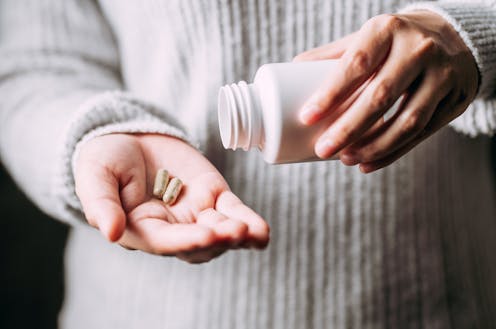Lots of women try herbs like black cohosh for menopausal symptoms like hot flushes – but does it work?
- Written by Sasha Taylor, Research fellow, Chronic Disease & Ageing, Monash University

Menopause is the stage of life where the ovaries stop releasing eggs and menstrual periods cease. Most Australian women go through menopause between 45 and 55 years of age, with the average age being 51 years, although some women may be younger.
Hot flushes and night sweats are typical symptoms of menopause, with vaginal dryness, muscle and joint pains, mood changes and sleep disturbance also commonly reported. Up to 75% of women experience menopausal symptoms, with nearly 30% severely affected.
These symptoms can negatively impact day-to-day life and wellbeing. The main therapies available include menopausal hormone therapy (MHT) and non-hormonal prescription therapy. Some women will elect to try complementary and alternative medicines, such as herbal medicines and nutritional supplements. Black cohosh is one of them.
Read more: How long does menopause last? 5 tips for navigating uncertain times
What causes hot flushes
The cause of hormonal hot flushes (also called hot flashes) still isn’t completely understood, but the decline in oestrogen at menopause appears to play a role in a process that involves the area of the brain that regulates temperature (the hypothalamus).
Factors linked to a greater likelihood of hot flushes include being overweight or having obesity and smoking.
MHT, previously known as hormone replacement therapy (HRT), usually includes oestrogen and is the most effective treatment for menopausal symptoms, such as hot flushes. But women may choose complementary and alternative medicines instead – either because they shouldn’t take hormone therapy, for example because they have breast cancer, or because of personal preference.
Close to 40% of Australian women report using complementary and alternative medicines for menopausal symptoms, and up to 20% using them specifically to treat hot flushes and sweats.
Read more: Is menopause making me put on weight? No, but it's complicated
A long history
Complementary and alternative medicines have a long history of use in many cultures. Today, their potential benefits for menopausal symptoms are promoted by the companies that make and sell them.
The complementary and alternative medicines women often try for menopausal symptoms include phytoestrogens, wild yam, dong quai, ginseng and black cohosh.
Black cohosh (plant name Cimicifuga racemosa) was traditionally used by Native Americans to treat a variety of health concerns such as sore throat, kidney trouble, musculoskeletal pain and menstrual problems. It is now a popular herbal choice for hot flushes and night sweats, as well as vaginal dryness and mood changes.
There are many theories for how the active ingredients in black cohosh might work in the body, such as acting like oestrogen, or affecting chemical pathways in the brain. But despite extensive research, the evidence to support these theories remains inconclusive.
It is also not clear whether black cohosh is effective for hot flushes. Results from individual studies are mixed, with some finding black cohosh improves hot flushes, while others have found it doesn’t.
A 2012 review combined all the results from studies of menopausal women using black cohosh to that date and found overall there was no proof black cohosh reduces hot flushes more effectively than an inactive treatment (placebo). This review also revealed that many studies did not use rigorous research methods, so the findings are hard to interpret.
A more recent review of clinical trials claimed black cohosh may ease menopausal symptoms, but the included studies were mostly small, less than six months long, and included women with mild symptoms.
There is also no meaningful evidence black cohosh helps other symptoms of menopause, such as vaginal symptoms, sexual problems, or poor general wellbeing, or that it protects against bone loss.
Evidence for how black cohosh is absorbed and metabolised by the body is also lacking, and it is not known what dose or formulation is best to use.
More good quality studies are needed to decide whether black cohosh works for hot flushes and other menopausal symptoms.
Is it safe to try?
A review of studies suggests black cohosh is safe to use, although many of the studies have not reported possible adverse reactions in detail. Side effects such as gastrointestinal upset and rashes may occur.
While there have been rare reports of liver damage, there is no clear evidence black cohosh was the cause. Even so, in Australia, black cohosh manufacturers and suppliers are required to put a warning label for the potential of harm to the liver on their products.
It is recommended black cohosh is not used by women with menopausal symptoms after breast cancer, as its safety after breast cancer is uncertain. All women should consult with their doctor before using black cohosh if they are taking other medications in case of possible drug interactions.
Many women like to try herbal therapies for hot flushes and other menopausal symptoms. While black cohosh is generally considered safe and some women may find it helps them, at the moment there is not enough scientific evidence to show its effects are any better than placebo.
Women experiencing troublesome menopausal symptoms, such as hot flushes, should talk to their doctor about the best treatment options for them.
Authors: Sasha Taylor, Research fellow, Chronic Disease & Ageing, Monash University




